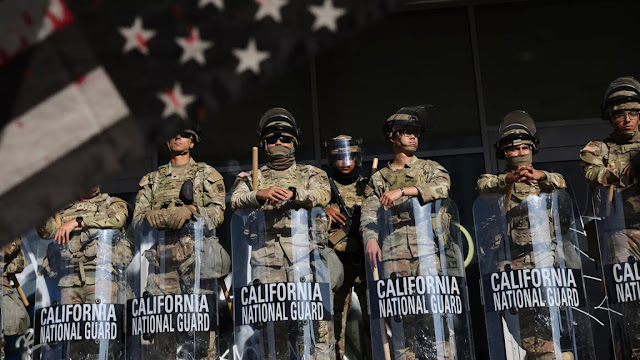A federal appeals court ruled Thursday that President Donald Trump likely acted within his constitutional authority when he took control of California’s National Guard in response to violent protests sparked by immigration raids earlier this month.
The Ninth U.S. Circuit Court of Appeals issued a unanimous decision extending a stay on a lower court ruling that had ordered the president to return control of the Guard to California Governor Gavin Newsom. The court found that Trump’s decision to federalize the Guard likely met the legal threshold required under federal law, particularly when existing federal forces were deemed insufficient to enforce U.S. laws.
Why Trump Federalized the Guard
On June 7, President Trump federalized the California National Guard and ordered 4,000 Guard members and 700 U.S. Marines to Los Angeles. The move came after widespread unrest broke out in response to federal immigration workplace raids across Southern California.
Protesters clashed with law enforcement, threw Molotov cocktails, rammed police barricades with dumpsters, and damaged property. Several federal vehicles were targeted, and injuries to officers were reported. In a statement at the time, Trump called the situation “a breakdown of law and order” and said the deployment was necessary to restore stability.
Governor Newsom’s Legal Challenge
Governor Newsom filed a lawsuit soon after, accusing the president of overstepping his authority. The suit argues that Trump’s federalization order violated state sovereignty and federal laws like the Posse Comitatus Act, which limits military involvement in domestic law enforcement.
In an earlier ruling, U.S. District Judge Charles Breyer sided with Newsom, finding that Trump failed to properly coordinate with the state and that the conditions did not justify federalizing the Guard. However, the Ninth Circuit disagreed — at least for now.
The appeals court said that even if procedural steps were mishandled, that did not justify removing the president’s command authority once federalization had occurred. Still, the court left open the larger constitutional questions surrounding how the Guard is being used in Los Angeles.
Key Legal Questions Remain
While the appeals court allowed President Trump to retain command, it did not rule on whether the deployment of troops in support of immigration enforcement — particularly alongside ICE — violates legal limits on military involvement in civilian matters.
Judge Breyer will hold additional hearings on Friday, June 20, to evaluate whether restrictions should be placed on the Guard’s activities in Los Angeles. Those hearings could define the boundary between lawful support and illegal direct involvement in law enforcement by military personnel.
Political Reactions
President Trump hailed the court’s ruling as “a victory for the rule of law,” and defended the deployment as “essential for the safety of the American people.”
“When cities are overwhelmed, the federal government has a duty to step in and secure our streets,” Trump said in a press briefing Thursday evening. “This is about protecting lives — nothing more.”
Governor Newsom fired back:
“This is not how a democracy works,” he said. “The president is not a king, and we will continue to challenge this reckless and unlawful use of military force in civilian neighborhoods.”
What’s at Stake
Legal experts say this case could set a precedent for how and when a president can override state control of the National Guard, especially during civil unrest related to politically charged issues like immigration.











